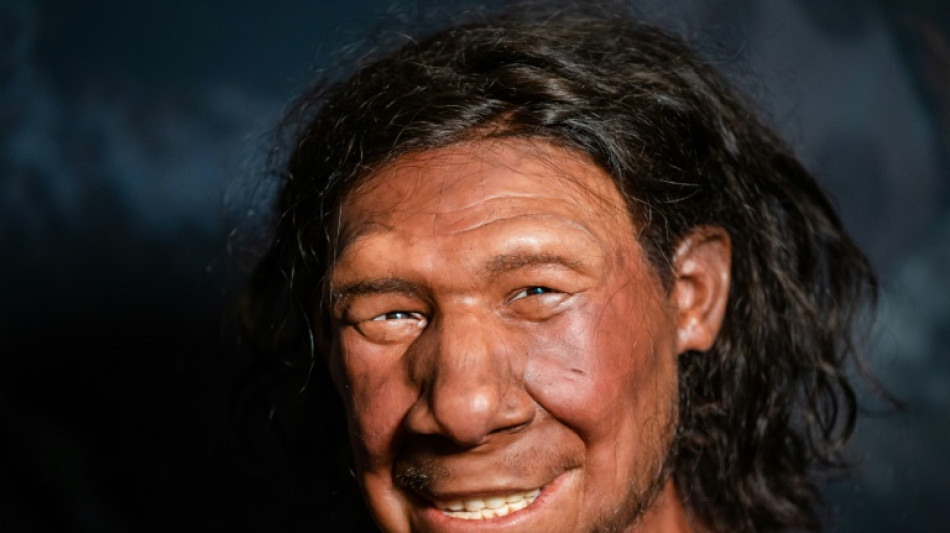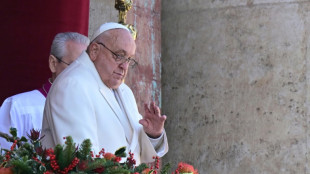
-
 'We couldn't find their bodies': Indonesian tsunami survivors mourn the dead
'We couldn't find their bodies': Indonesian tsunami survivors mourn the dead
-
Azerbaijan mourns 38 killed in plane crash in Kazakhstan

-
 Konstas and Khawaja put Australia on top in 4th Test against India
Konstas and Khawaja put Australia on top in 4th Test against India
-
Lakers pip Warriors after another LeBron-Curry classic

-
 India readies for 400 million pilgrims at mammoth festival
India readies for 400 million pilgrims at mammoth festival
-
Nepal hosts hot air balloon festival

-
 Asia stocks up as 'Santa Rally' persists
Asia stocks up as 'Santa Rally' persists
-
Tears, prayers as Asia mourns tsunami dead 20 years on

-
 Sydney-Hobart yacht crews set off on gale-threatened race
Sydney-Hobart yacht crews set off on gale-threatened race
-
Key public service makes quiet return in Gaza

-
 Fearless Konstas slams 60 as Australia take upper hand against India
Fearless Konstas slams 60 as Australia take upper hand against India
-
Bridges outduels Wembanyama, Celtics lose again

-
 Hungry Sabalenka ready for more Slam success
Hungry Sabalenka ready for more Slam success
-
Mass jailbreak in Mozambique amid post-election unrest

-
 Azerbaijani jet crashes in Kazakhstan, killing 38
Azerbaijani jet crashes in Kazakhstan, killing 38
-
Bridges outduels Wembanyama as Knicks beat Spurs

-
 2004 Indian Ocean tsunami: what to know 20 years on
2004 Indian Ocean tsunami: what to know 20 years on
-
Asia to mourn tsunami dead with ceremonies 20 years on

-
 Syrians protest after video of attack on Alawite shrine
Syrians protest after video of attack on Alawite shrine
-
Russian state owner says cargo ship blast was 'terrorist attack'

-
 38 dead as Azerbaijani jet crashes in Kazakhstan
38 dead as Azerbaijani jet crashes in Kazakhstan
-
Crisis-hit Valencia hire West Brom's Corberan as new boss

-
 Suriname ex-dictator and fugitive Desi Bouterse dead at 79
Suriname ex-dictator and fugitive Desi Bouterse dead at 79
-
35 feared dead as Azerbaijani jet crashes in Kazakhstan

-
 Pope calls for 'arms to be silenced' in Christmas appeal
Pope calls for 'arms to be silenced' in Christmas appeal
-
Syria authorities say torched 1 million captagon pills

-
 Pope calls for 'arms to be silenced' across world
Pope calls for 'arms to be silenced' across world
-
32 survivors as Azerbaijani jet crashes in Kazakhstan

-
 Pakistan air strikes kill 46 in Afghanistan, Kabul says
Pakistan air strikes kill 46 in Afghanistan, Kabul says
-
Liverpool host Foxes, Arsenal prepare for life without Saka

-
 Japan FM raises 'serious concerns' over China military buildup
Japan FM raises 'serious concerns' over China military buildup
-
Pope's sombre message in Christmas under shadow of war

-
 Zelensky condemns Russian 'inhumane' Christmas attack on energy grid
Zelensky condemns Russian 'inhumane' Christmas attack on energy grid
-
Sweeping Vietnam internet law comes into force

-
 Pope kicks off Christmas under shadow of war
Pope kicks off Christmas under shadow of war
-
Catholics hold muted Christmas mass in Indonesia's Sharia stronghold

-
 Japan's top diplomat in China to address 'challenges'
Japan's top diplomat in China to address 'challenges'
-
Thousands attend Christmas charity dinner in Buenos Aires

-
 Demand for Japanese content booms post 'Shogun'
Demand for Japanese content booms post 'Shogun'
-
As India's Bollywood shifts, stars and snappers click

-
 Mystery drones won't interfere with Santa's work: US tracker
Mystery drones won't interfere with Santa's work: US tracker
-
Djokovic eyes more Slam glory as Swiatek returns under doping cloud

-
 Australia's in-form Head confirmed fit for Boxing Day Test
Australia's in-form Head confirmed fit for Boxing Day Test
-
Brazilian midfielder Oscar returns to Sao Paulo

-
 'Wemby' and 'Ant-Man' to make NBA Christmas debuts
'Wemby' and 'Ant-Man' to make NBA Christmas debuts
-
US agency focused on foreign disinformation shuts down

-
 On Christmas Eve, Pope Francis launches holy Jubilee year
On Christmas Eve, Pope Francis launches holy Jubilee year
-
'Like a dream': AFP photographer's return to Syria

-
 Chiefs seek top seed in holiday test for playoff-bound NFL teams
Chiefs seek top seed in holiday test for playoff-bound NFL teams
-
Panamanians protest 'public enemy' Trump's canal threat


Was a lack of get-up-and-go the death of the Neanderthals?
A new study posits a very surprising answer to one of history's great mysteries -- what killed off the Neanderthals?
Could it be that they were unadventurous, insular homebodies who never strayed far enough from home?
Scientists studying the remains of a Neanderthal found in France said Wednesday that these human relatives were socially isolated from each other for tens of thousands of years, which could have fatally reduced their genetic diversity.
Up to now, the main theories for their demise were climate change, a disease outbreak, and even violence -- or interbreeding -- with Homo Sapiens.
Neanderthals populated Europe and Asia for a long time -- including a decent stint living alongside early modern humans -- until they abruptly died off 40,000 years ago.
That was the last moment when more than one species of human coexisted on Earth, French archaeologist Ludovic Slimak told AFP.
It was a "profoundly enigmatic moment, because we do not know how an entire humanity, which existed from Spain to Siberia, could suddenly go extinct," he said.
Slimak is the lead author of a new study in the journal Cell Genomics, which looked at the fossilised remains of a Neanderthal discovered in France's Rhone Valley in 2015.
The remains were found in Mandrin cave, which is known to have been home to both Neanderthals and Homo Sapiens over time.
The Neanderthal, dubbed Thorin in reference to the dwarf in J.R.R. Tolkien's "The Hobbit", is a rare find.
Thorin is the first Neanderthal unearthed in France since 1978 -- and one of only roughly 40 discovered in all of Eurasia.
- 50,000 years alone -
The archaeologists had spent a decade unsuccessfully trying to recover DNA from Mandrin cave when they found Thorin, Slimak said.
"As soon as the body came out of the ground," they sent a piece of molar to geneticists in Copenhagen for analysis, he added.
When the results came back, the team was stunned. Archaeological data had suggested the body was 40,000 to 45,000 years old, but the genomic analysis found it was from 105,000 years ago.
"One of the teams must have gotten it wrong," Slimak said.
It took seven years to get the story straight.
Analysing isotopes from Thorin's bones and teeth showed that he lived in an extremely cold climate, which matched an ice age only experienced by later Neanderthals around 40,000 years ago.
But Thorin's genome did not match those of previously discovered European Neanderthals at that time. Instead it resembled the genome of Neanderthals some 100,000 years ago, which had caused the confusion.
It turned out that Thorin was a member of an isolated and previously unknown community that had descended from some of Europe's earliest Neanderthal populations, the researchers said.
"The lineage leading to Thorin would have separated from the lineage leading to the other late Neanderthals around 105,000 years ago," senior study author Martin Sikora of the University of Copenhagen said in a statement.
This other lineage then spent a massive 50,000 years "without any genetic exchange with classic European Neanderthals," including some that only lived a two-week walk away, Slimak said.
- Dangers of inbreeding -
This kind of extended social isolation is unimaginable for the Neanderthals' cousins, the Homo Sapiens, particularly because the Rhone Valley then was a great migration corridor between northern Europe and the Mediterranean Sea.
Archaeological finds have long suggested that Neanderthals lived in a small area, ranging just a few dozen kilometres from their home.
Homo Sapiens, in comparison, had "infinitely larger" social circles, spreading over tens of thousands of square kilometres, Slimak said.
Neanderthals were also known to have lived in small groups -- so not venturing far likely meant there were not many options for a mate outside of their own family.
This kind of inbreeding reduces the genetic diversity in a species, which can spell doom over the long term.
Rather than single-handedly killing off the Neanderthals, their lack of intermingling could have made them more vulnerable to some of the other popular theories for their demise.
"When you are isolated for a long time, you limit the genetic variation that you have, which means you have less ability to adapt to changing climates and pathogens," said study co-author Tharsika Vimala, a population geneticist at the University of Copenhagen.
"It also limits you socially because you're not sharing knowledge or evolving as a population," she said.
H.E.Young--AMWN



